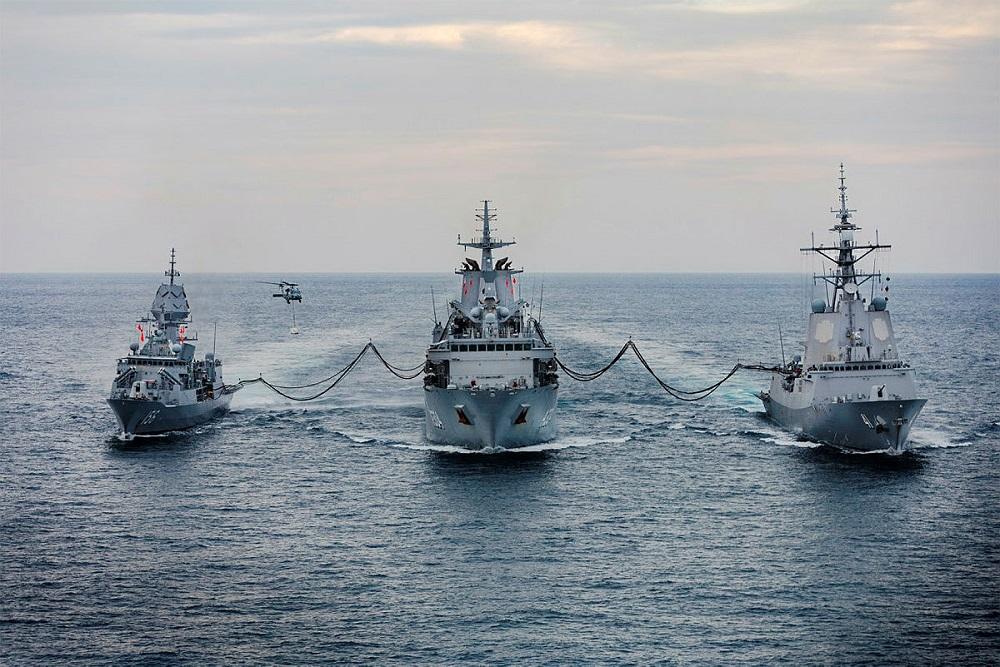Australia’s ‘tier-2’ naval expansion opens the door for the Anzac frigate redux
Posted By Euan Graham on February 23, 2024 @ 09:01

This week’s unveiling of the expansionary blueprint [1] for Australia’s future naval surface fleet brings with it a golden opportunity to revive defence cooperation between Australia and its occasionally ambivalent ally, New Zealand. Specifically, the announcement that Australia will acquire up to 11 general purpose frigates opens the door for New Zealand to join the acquisition process for its own Anzac frigate replacement.
When New Zealand defence minister, Judith Collins visited Melbourne recently to attend the inaugural ANZMIN [2] joint ministerial conclave, she invoked the ‘Anzac model [3]‘, in the context of seeking greater inter-operability between Australia and New Zealand’s defence capabilities. In recent times, the Anzac model is most associated with the Anzac frigate programme, which saw Australia and New Zealand acquire eight and two hulls, respectively, from a common German MEKO-design in the 1990s. The Anzacs have proved to be durable workhorses, on both sides of the Tasman, but they are now in the twilight of their operational lives. HMAS Anzac will shortly become the first ship in that class to be decommissioned.
Only last week, the possibility of New Zealand buying into a common hull design with Australia for the replacement to its two, aging Anzac frigates [4] appeared remote. Australia’s Hunter frigate programme, frequently castigated [5] in the media for being overweight, overdue and overbudget, but now backed in by the surface fleet review, remains well beyond Wellington’s more limited means and naval ambitions. Now, Canberra’s commitment to buy an off-the-shelf frigate, of a more modest design has changed the calculus overnight, bringing the Anzac model of a synchronised warship acquisition back into play, after a long recess.
For New Zealand, the economies of scale involved in a joint acquisition with Australia point to one inescapable advantage, lower unit costs. But Wellington would need to come in quickly to have any say over the decision. New Zealand’s next defence capability plan, the first under its new coalition government, will surface in June. That could provide a helpful forcing function for Christopher Luxon’s cabinet to reach internal agreement on whether to join forces with Australia. With contradictory signals on defence spending emerging from the new government so far, it helps to have an eye on the prize.
That prize is a gifted opportunity to recapitalise New Zealand’s surface force at an affordable price tag, with the potential for a modest expansion from 2 to 3 frigates, ensuring that the Royal New Zealand Navy (RNZN) has at least one surface combatant available at any one time—a minimal requirement given New Zealand’s scale of maritime responsibilities [6].
New frontline frigates, with far more combat capability than New Zealand’s current Anzacs, would bring further strategic dividends, giving New Zealand greater leverage—not only in the alliance relationship with Australia, but enabling a more regular and credible naval presence, from the Pacific to Southeast Asia, where Wellington remains a founding party to the Five Power Defence Arrangements [7]. Three modern frigates, displacing between 3,500-5,000 tons and equipped with vertically launched air defence and anti-ship missiles, would give the RNZN a combat capability that is currently scant not just within the navy, but across all three services.
For Australia, a more capable New Zealand surface force would be an obvious plus, shoring up more aggregate Anzac heft, including in the increasingly contested expanses of Oceania and the neglected Southern Ocean. And while Wellington and Canberra’s threat perceptions do not always align, their interests do broadly coincide. The overlap is big enough to make an interchangeable capability an objective worth aiming for.
Joint crewing of Australia’s Anzac replacements with sailors from New Zealand could be a trickier proposition than joint acquisition and sustainment. But it’s also worth consideration with imagination. Both parties could gain out of an arrangement that enables New Zealand crew to obtain operational experience on Australia’s new frigates before their own enter into service, while potentially helping Australia’s navy to weather recruitment shortfalls as it undergoes a challenging expansion of both its surface and submarine fleets over the next 15 years.
Article printed from The Strategist: https://aspistrategist.ru
URL to article: /australias-tier-2-naval-expansion-opens-the-door-for-the-anzac-frigate-redux/
URLs in this post:
[1] blueprint: https://www.defence.gov.au/about/reviews-inquiries/independent-analysis-navy-surface-combatant-fleet
[2] ANZMIN: https://www.minister.defence.gov.au/statements/2024-02-01/joint-statement-australia-new-zealand-ministerial-consultations-anzmin-2024
[3] Anzac model: /building-an-australia-new-zealand-alliance-fit-for-the-21st-century/
[4] Anzac frigates: https://www.nzdf.mil.nz/nzdf/our-equipment/ships-and-watercraft/hmnzs-te-mana/
[5] castigated: https://www.afr.com/politics/federal/late-and-overweight-frigates-worth-45b-may-face-cuts-20230907-p5e2qr
[6] maritime responsibilities: https://www.mfat.govt.nz/en/environment/oceans-and-fisheries/our-maritime-zones-and-boundaries/
[7] Five Power Defence Arrangements: https://www.iiss.org/online-analysis/online-analysis/2020/12/five-power-defence-arrangements
Click here to print.